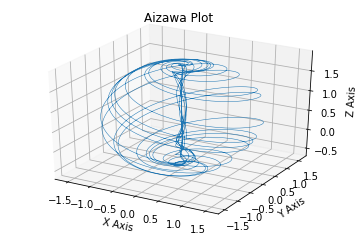Here we are finished on a new machine. The last two machines broke down. But I finished before new years.
The PSO - Partical Swarm Optimization algorithm has a number of particals each having a velocity and a position vector, the position denotes a solution to De Jongs classic sphere optimization problem. See
ref .
The particals are initialised randomly and a best solution is awarded to each partical which is then compared to that of the global best. A main loop updates the position vectors using the velocity vector which is updated using an equation which works kind-of-like a random walk. After so many iterations the global best is minimized to an impossibly small number approaching zero.
This was a fun project and with more tinkering I hope to produce a graphical output using opengl and aswell as applying other optimization problems I am hoping to have it switch between the naturally observed flocking behaviours used by the Artificial Life Algorithms -
Boids. It would be interesting to see if flocking behaviours can benefit the convergence to optimal solutions making it a hybrid between the two very different algorithms.
Firstly here is the basic PSO algo in C++. Enjoy.
- Code: Select all
#include <stdio.h>
#include <stdlib.h>
#include <iostream>
#include <math.h>
using namespace std;
double func1(double* pos,int dim);
double getlrand(double upper,double lower);
class partical{
public:
double *velocity;
double *position;
double *localg;
void init(int dimsize){
velocity = new double[dimsize];
position = new double[dimsize];
localg = new double[dimsize];
}
};
class swarm{
public:
partical *p;
double *globalg;
int popsize,dim;
double upper,lower,lrt,deltag,deltap,w;
double (*evalfunc)(double *pos,int dim);
swarm(int number,int dimsize){
popsize = number;
dim = dimsize;
globalg = new double[dimsize];
p = new partical[number];
for(int i=0;i<number;i++){
p[i].init(dim);
}
}
void initialise(double w_,double deltag_,double deltap_,double
lrt_,double upper_,double lower_,double (*evalfunc_) (double*
pos,int dim))
{
upper=upper_;
lower=lower_;
lrt=lrt_;
deltag=deltag_;
deltap=deltap_;
w=w_;
evalfunc=evalfunc_;
for(int j=0;j<dim;j++){
globalg[j] = getlrand(lower,upper);
}
for(int i=0;i<popsize;i++){
for(int j=0;j<dim;j++){
p[i].position[j] = getlrand(lower,upper);
p[i].velocity[j] = getlrand(lower,upper);
p[i].localg[j] = p[i].position[j];
}
if(evalfunc(p[i].localg,3)<evalfunc(globalg,3)){
for(int k=0;k<dim;k++)
globalg[k] = p[i].localg[k];
}
}
}
void printout(){
for(int i=0;i<popsize;i++){
for(int j=0;j<dim;j++){
cout << "partical" <<i<<"\n";
cout << evalfunc(p[i].position,3) << "\n";
}
}
for(int j=0;j<dim;j++){
cout << "Global Best = " <<evalfunc(globalg,3) << "\n";
}
}
void mainloop(int iter_){
double rp[dim],rg[dim];
for(int iter=0;iter<iter_;iter++){
for(int j=0;j<dim;j++){
cout << "Global Best = " <<evalfunc(globalg,3) << "\n";
}
for(int i=0;i<popsize;i++){
for(int j=0;j<dim;j++){
rp[j] = getlrand(lower,upper);
rg[j] = getlrand(lower,upper);
//Update velocity
p[i].velocity[j] = w*p[i].velocity[j] + deltap * rp[j] * (p[i].localg[j]-p[i].position[j]) + deltag*rg[j]*(globalg[j]-p[i].position[j]);
//Update position
p[i].position[j] = p[i].position[j] + lrt * p[i].velocity[j];
//cout<<p[i].position[0]<<"************\n";
}
if(evalfunc(p[i].position,3)<evalfunc(p[i].localg,3)){
for(int k=0;k<dim;k++)
p[i].localg[k] = p[i].position[k];
}
if(evalfunc(p[i].localg,3)<evalfunc(globalg,3)){
for(int k=0;k<dim;k++)
globalg[k] = p[i].localg[k];
}
}
}
}
};
double func1(double* pos,int dim){
/*dim=3*/
return pow(pos[0],2) + pow(pos[1],2) + pow(pos[3],2);
//return pos[0];
}
double getlrand(double lower,double upper){
return ((double) rand()/ RAND_MAX) * (upper-lower) + lower;
}
int main(){
swarm myswarm(55,3);
myswarm.initialise(0.34,0.05,0.055,0.75,10,-10,func1);
myswarm.mainloop(1000);
myswarm.printout();
}
Sneak a peak @ Shepherds latest works DarkSide - Chapter 2 - The Watchers
Or Read Kromos now :

